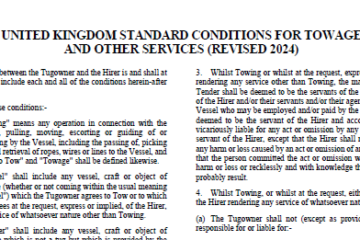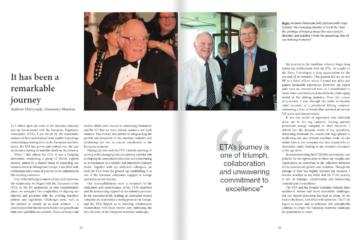1. EP Plenary Sessions on 7th March (discussion) + 8th March 2016 (vote)
On 25th of January 2016 the Transport and Tourism Committee of the European Parliament
(“TRAN”) adopted the Draft Report following compromise amendments of Rapporteur Knut
Fleckenstein (S&D, Hamburg) on the proposal for a regulation establishing a legislative
framework for port services and ports.
The voting outcome resulted into 29 votes in favour, 13 against adopting and 3 abstentions.
The mandate to the TRAN Committee to enter into negotiations with the Council and the
European Commission [Rule 73(2)] did not get the required qualified majority of 25 votes, being
rejected by 1 vote.
The Plenary of the European Parliament shall consider whether such mandate should
nevertheless be given, either on the adopted text or an amended version. Discussions and
voting shall take place on 7th and 8th March 2016.
2. ETA calls for rejection
The ETA maintains its position that the Draft Regulation should be rejected or withdrawn by the
Commission under the European Commission’s Regulatory Fitness and Performance
programme (“REFIT”).
It fails to address the challenges that the Commission brought forward for its proposed
legislation.
3. Objectives of the European Commission
The European Commission, by launching this third attempt to regulate port services and ports
“Establishing a framework on market access to port services and the financial transparency of
ports “, aims to contribute to more efficient, interconnected and sustainable functioning of TENT
ports, including a.o.:
- Improving the performance of ports through counteracting possible market abuses and increasing efficiency of port services
- Modernising port services and operations
- Attracting investment in ports
4. Better Regulation and Proportionality failure
Definition of port services
In its amended format put to vote, subject to further possible amendments tabled in Plenary, the
Draft Regulation would be “establishing a framework for the organisation of port services and
for financial transparency of ports”.
While agreeing on the Rapporteur’s opinion that “the scope of the regulation should only include
those port services that are offered directly to the users” so that dredging cannot be called a
“port service”, port services in actual fact include:
- bunkering
- port reception facilities
- cargo handling
- mooring
- passenger services
- pilotage
- towage
Scope of Chapter II of the Regulation
Article 11 of the adopted Draft limits the scope of the whole Chapter II (now called “Organisation
of port services” instead of “Market Access”), with the exception of article 10a (on training
requirements an labour protection), to :
- bunkering
- port reception facilities
- mooring
- towage
This means that the legal framework would only organise 4 port services out of 7. Consequently,
the Draft gives the impression that the other services, unlike towage, either would not have to
be organised by a European legal framework, or are not in need of enhanced efficiency,
modernising, lifting of potential market access barriers nor attracting investments.
Only 2 out of 3 “technical-nautical services” would be covered.
The Commission itself, when quoting from its impact assessments has acknowledged that, “in
terms of internal repartition of costs [i.e. port charges] port infrastructure charges represent
between 5-10%, technical-nautical services [including pilotage] between 10-15%, cargo
handling between 45-60%.”
This selective, unfair and limited application reveals total inconsistence with the objectives that
the Commission brought forward to maintain its proposal.
Consequently, it is immediately clear that this Regulation, apart from Chapter III on transparency
for port finances, would not stand the test of Better Regulation and/or proportionality as it would
limit its intended impact to a fraction of port services, contributing the least to port charges, as
opposed to those services not falling under the scope.
5. No exemption for towage: denial of the vital contribution of towage to safety in ports
By not exempting towage, like pilotage, from Chapter II on the organisation of port services
(article 11) the Draft Regulation negates the vital role of towage providers in safe operations and
environmental protection in ports.
The Rapporteur acknowledges “the high relevance of pilotage for safe and secure port
operations” in his Explanatory Statement; however, no single port user and/or port authority
would not consider towage as equally indispensable to maintain the highest level of navigational
safety.
Towage operators often work within a framework of public service obligation contracts by virtue
of which they are obliged to provide safe and efficient harbour towage services and response to
safety related incidents.
Major economic and environmental catastrophes in European ports are often avoided thanks to
prompt and adequate intervention of tugs.
Two recent examples among several others were the successful re-floating of a mega carrier,
like the CSCL Indian Ocean, with its cargo of up to 18,900 TEU in February 2016 on the Elbe,
requiring assistance of 12 tugs. See: https://gcaptain.com/watch-video-captures-refloating-ofcscl-indian-ocean/
and the avoidance of collision in the port of Valencia by ETA member tugs.
See: http://worldmaritimenews.com/archives/183268/video-near-miss-for-boxship-giants-invalencia/.
6. Lacking of clear rules on state aid in ports
Whereas Rapporteur Fleckenstein had repeatedly underlined the link between the Port
Regulation and state aid rules for ports securing investments for sustainable port infrastructure,
the review of the scope of the Block Exemption Regulation, announced repeatedly by the
Commission is still lacking. This undermines the relevance of Chapter III on Transparency, as it
proposes a set of rules on the use of public funds, the definition of which is not clarified hitherto
in state aid rules.
Download the document by clicking here



0 Comments